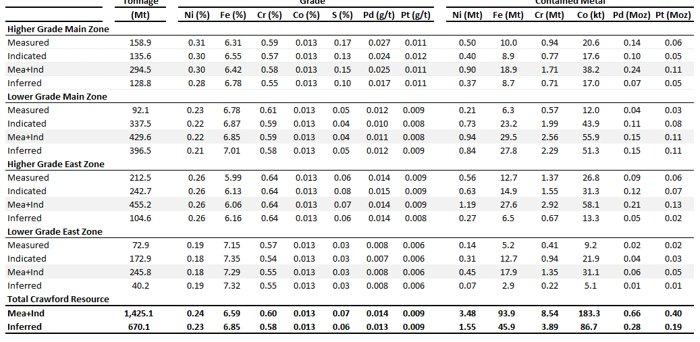
Updated Mineral Resource Estimate Doubles Measured & Indicated Resources at Canada Nickel’s Crawford Nickel Sulphide Project
- Updated mineral resource estimate more than doubles Measured & Indicated resources to 1.4 billion tonnes at 0.24% nickel plus a further 670 million tonnes of Inferred resources at 0.23% nickel
- Crawford now believed to be fifth largest nickel sulphide resource globally comprising 3.5 million tonnes of contained Measured & Indicated nickel
Canada Nickel Company Inc. ("Canada Nickel" or the "Company") (TSXV: CNC) (OTCQX: CNIKF – https://www.commodity-tv.com/ondemand/companies/profil/canada-nickel-company-inc/) announced today an updated mineral resource estimate for its 100% owned Crawford Nickel Sulphide Project (“Crawford”) near Timmins, Ontario, more than doubling the project’s Measured & Indicated (M&I) mineral resources.
Mark Selby, Chair and Chief Executive Officer said, “We are very pleased with our continued exploration success at Crawford. Our overall Measured & Indicated resource has more than doubled, driven in large part by outstanding exploration success in our East Zone. In less than three years from initial discovery, we believe Crawford has quickly become the fifth largest nickel sulphide resource globally. When combined with the potential for zero carbon production, Crawford is expected to become an important source of nickel for electric vehicle and stainless-steel producers. With additional potential from a number of holes still pending assays at the resource cut-off date, we expect the final feasibility study resource to support the upper end of our mine plan target of 1.3 to 1.8 billion tonnes. The Crawford feasibility study continues to be on track for completion by year-end.”
Crawford Mineral Resource Estimate Update
Total M&I resources more than doubled to 1.43 billion tonnes at 0.24% nickel and Inferred resource was 0.67 billion tonnes at 0.23% nickel (see Table 1). The East Zone M&I resource increased by more than 14-fold to 701 Mt at 0.23% nickel and the Main Zone resource increased by 17% to 724 Mt at 0.25% nickel. With 3.48 Mt of contained nickel in M&I resources, the company believes Crawford has the fifth largest contained nickel sulphide resource globally. M&I resources also include 93.9 Mt of iron, 8.5 Mt of chromium, 183 kt of cobalt, and 1.06 million ounces of palladium + platinum.
This updated resource is based on a combined total of 113 drillholes and 56,286 metres of drilling. Consistent with previously reported resources, a cut-off grade of 0.15% nickel was used in the Mineral Resource Estimate. Higher grade-Lower grade, and block model views of the resource estimate are provided in Figures 2 and 3 below. Sixty percent of assays from 54 additional exploration drillholes in the East and Main Zone that had not yet been received as of the resource cutoff date will be subsequently incorporated into the final feasibility study resource. Given the focus on the Main and East Zone as resources for this phase of the feasibility study, resources for North Zone (15 drill holes) and Western Extension (38 drill holes) are expected to be completed later this year and incorporated into the final feasibility study.
This Mineral Resource Estimate was prepared by Caracle Creek International Consulting Inc. in accordance with CIM Definition Standards on Mineral Resources and Reserves. A Technical Report in support of the Mineral Resource Estimate will be filed on SEDAR (www.sedar.com) within 45 days. The Mineral Resource Estimate is effective as of July 6, 2022.
East Zone
Drilling completed during 2021 and early 2022 joined the two previously isolated sections of mineralization. The updated resource, consisting of a total of 47 drill holes and 22,563 metres, extended the resource by 500 metres to the east for a total of 2.6 kilometres in strike length, up to 350 metres in width, and more than 650 metres deep. Drilling extended mineralization a further 200 metres to the east and mineralization remains open at depth. Higher grade mineralization continues at depth beyond the current resource as tested by hole CR22-230 which was completed to a depth of 1,155 metres. Assays for this hole are pending.
Main Zone
Drilling in the Main Zone focused near the west extension as well as testing the continuation of higher-grade targets at depth. The Main Zone resource now consists of a total of 66 drillholes and 33,723 metres of drilling and is defined across strike length of 1.9 kilometres, a width of up to 580 metres and 700 metres deep. Higher grade mineralization continues at depth beyond the current resource as tested by hole CR22-198 which was completed to a depth of 1,044 metres. Assays for this hole are pending.
Next Steps – Exploration:
- A technical report with respect to the Mineral Resource Estimate Update disclosed today will be filed within 45 days as required by The National Instrument NI 43-101 – Standards of Disclosure of Mineral Projects.
- Mineralogical studies and metallurgical test work will continue through the fall of 2022 and will be incorporated into the Feasibility Study expected to be completed by the end of calendar 2022.
- Additional exploration drillholes in the East and Main Zones will be added to the resource once assays are received and any final drilling to upgrade any inferred resource remaining within the feasibility study mine plan.
- Regional exploration program remains ongoing.
Assays, Quality Assurance/Quality Control and Drilling and Assay Edwin Escarraga, MSc, P.Geo., a "qualified person" as defined by National Instrument 43-101, is responsible for the on-going drilling and sampling program, including quality assurance (QA) and quality control (QC). The core is collected from the drill in sealed core trays and transported to the core logging facility. The core is marked and sampled at 1.5 metre lengths and cut with a diamond blade saw. One set of samples is transported in secure bags directly from the Canada Nickel core shack to Actlabs Timmins, while a second set of samples is securely shipped to SGS Lakefield for preparation, with analysis performed at SGS Burnaby or SGS Callao (Peru). All are ISO/IEC 17025 accredited labs. Analysis for precious metals (gold, platinum and palladium) are completed by Fire Assay while analysis for nickel, cobalt, sulphur and 17 other elements are performed using a peroxide fusion and ICP-OES analysis. Certified standards and blanks are inserted at a rate of 3 QA/QC samples per 20 core samples making a batch of 60 samples that are submitted for analysis. Qualified Person and Data Verification Stephen J. Balch P.Geo. (ON), VP Exploration of Canada Nickel and a "qualified person" as is defined by National Instrument 43-101, has verified the data disclosed in this news release, and has otherwise reviewed and approved the technical information in this news release on behalf of Canada Nickel Company Inc. About Canada Nickel Company
Canada Nickel Company Inc. is advancing the next generation of nickel-sulphide projects to deliver nickel required to feed the high growth electric vehicle and stainless steel markets. Canada Nickel Company has applied in multiple jurisdictions to trademark the terms NetZero NickelTM, NetZero CobaltTM, NetZero IronTM and is pursuing the development of processes to allow the production of net zero carbon nickel, cobalt, and iron products. Canada Nickel provides investors with leverage to nickel in low political risk jurisdictions. Canada Nickel is currently anchored by its 100% owned flagship Crawford Nickel Sulphide Property in the heart of the prolific Timmins-Cochrane mining camp. For more information, please visit www.canadanickel.com.
For further information, please contact:
Mark Selby, Chair and CEO
Phone: 647-256-1954
Email: info@canadanickel.com
In Europe:
Swiss Resource Capital AG
Jochen Staiger
info@resource-capital.ch
www.resource-capital.ch
Cautionary Statement Concerning Forward-Looking StatementsThis press release contains certain information that may constitute "forward-looking information" under applicable Canadian securities legislation. Forward looking information includes, but is not limited to, drill results relating to the Crawford Nickel Sulphide Property, the potential of the Crawford Nickel Sulphide Property, timing of economic studies and mineral resource estimates, the project mine plan, the ability to sell marketable materials, strategic plans, including future exploration and development results, and corporate and technical objectives. Forward-looking information is necessarily based upon a number of assumptions that, while considered reasonable, are subject to known and unknown risks, uncertainties, and other factors which may cause the actual results and future events to differ materially from those expressed or implied by such forward-looking information. Factors that could affect the outcome include, among others: future prices and the supply of metals, the future demand for metals, the results of drilling, inability to raise the money necessary to incur the expenditures required to retain and advance the property, environmental liabilities (known and unknown), general business, economic, competitive, political and social uncertainties, results of exploration programs, risks of the mining industry, delays in obtaining governmental approvals, failure to obtain regulatory or shareholder approvals, and the impact of COVID-19 related disruptions in relation to the Company’s business operations including upon its employees, suppliers, facilities and other stakeholders. There can be no assurance that such information will prove to be accurate, as actual results and future events could differ materially from those anticipated in such information. Accordingly, readers should not place undue reliance on forward-looking information. All forward-looking information contained in this press release is given as of the date hereof and is based upon the opinions and estimates of management and information available to management as at the date hereof. Canada Nickel disclaims any intention or obligation to update or revise any forward-looking information, whether as a result of new information, future events or otherwise, except as required by law.
Table 1
- The independent Qualified Person for the Mineral Resource Estimate, as defined by NI 43-101, is Dr. Scott Jobin-Bevans (P.Geo., APGO #0183), of Caracle Creek International Consulting Inc. The effective date of the Mineral Resource Estimate is July 6, 2022.
- These Mineral Resources are not Mineral Reserves as they do not have demonstrated economic viability. The quantity and grade of reported Inferred Resources in this Mineral Resource Estimate are uncertain in nature and there has been insufficient exploration to define these Inferred Resources as Indicated or Measured. However, it is reasonably expected that the majority of Inferred Mineral Resources could be upgraded to Indicated Mineral Resources with continued exploration.
- A cut-off grade of 0.15% Ni was used for all domains. Cut-offs were determined on the basis of core assay geostatistics and drill core lithologies for the deposit, and by comparison to analogous deposit types.
- Geological and block models for the Mineral Resource Estimate used data from a total of 113 surface drill holes (66 in the Main Zone and 47 in the East Zone). The drill hole database was validated prior to resource estimation and QA/QC checks were made using industry-standard control charts for blanks, core duplicates and commercial certified reference material inserted into assay batches by Canada Nickel, and by comparison of umpire assays performed at a second laboratory.
- Estimates have been rounded to two significant figures.
- The mineral resource estimates have been constrained by conceptual pit envelopes using the following optimization parametres. Metal prices used (US$) were $7.75/lb nickel, $15/lb cobalt, $$290/tonne iron, $1.04/lb chromium, $1,600/oz Pd, and $800/oz Pt. Different pit slopes were used for each layer (in degrees): 9.5 in clay, 21.8 in gravel and 45 in rock. Exchange rate utilized was US$/C$ of $0.75. Mining costs utilized different values for overburden (clay, gravel), selective mining and bulk mining ranging from C$1.75 to C$3.15/t mined. Processing costs and G&A for 100ktpd operation were C$6.18/t. Based on the range of grade and ratio of sulphur to nickel at Crawford, recovery could be expected to range from 10% – 60%. It has also been assumed that 30 – 40% of total iron would be recovered to a saleable magnetite concentrate.
- The Mineral Resource Estimate was prepared following the CIM Estimation of Mineral Resources & Mineral Reserves Best Practice Guidelines (November 29, 2019).
MAIN ZONE:
- The geological model as applied to the Mineral Resource Estimate for the Main Zone comprises three mineralized domains hosted by variably serpentinized ultramafic rocks: a relatively higher-grade core (largely dunite) and two northern and southern lower grade envelopes (combination of dunite and peridotite). Individual wireframes were created for each domain.
- The block model was prepared using Isatis.neo 2022. A 20 m x 20 m x 15 m block model was created and samples were composited at 7.5 m intervals. Grade estimation from drill hole data was carried out for Ni, Co, Fe, Cr, S, Pd and Pt using the Ordinary Kriging interpolation method.
- Grade estimation was validated by comparison of input and output statistics (Nearest Neighbour and Inverse Distance Squared methods), swath plot analysis, and by visual inspection of the assay data, block model, and grade shells in cross-sections.
- Density estimation was carried out for the mineralized domains using the Ordinary Kriging interpolation method, on the basis of 5,411 specific gravity measurements collected during the core logging process, using the same block model parametres of the grade estimation. As a reference, the average estimated density value within the higher-grade is 2.69 g/cm3 (t/m3), while low-grade domains of the resource model yielded averages of 2.67 g/cm3 (t/m3) in the north and 2.73 g/cm3 (t/m3) in the south.
EAST ZONE:
- The geological model as applied to the Mineral Resource Estimate for the East Zone comprises three mineralized domains hosted by variably serpentinized ultramafic rocks: a relatively higher-grade core (largely dunite) and two northern and southern lower grade envelopes (largely peridotite). Individual wireframes were created for each domain.
- The block model was prepared using Isatis.neo 2022. A 20 m x 20 m x 15 m block model was created and samples were composited at 7.5 m intervals. Grade estimation from drill hole data was carried out for Ni, Co, Fe, Cr, S, Pd and Pt using the Ordinary Kriging interpolation method.
- Grade estimation was validated by comparison of input and output statistics (Nearest Neighbour and Inverse Distance Squared methods), swath plot analysis, and by visual inspection of the assay data, block model, and grade shells in cross-sections.
Density estimation was carried out for the mineralized domains using the Ordinary Kriging interpolation method, on the basis of 2,798 specific gravity measurements collected during the core logging process, using the same block model parametres of the grade estimation. As a reference, the average estimated density value within the higher-grade is 2.63 g/cm3 (t/m3), while low-grade domains of the resource model yielded averages of 2.72 g/cm3 (t/m3) in the north and 2.74 g/cm3 (t/m3) in the south.
Swiss Resource Capital AG
Poststrasse 1
CH9100 Herisau
Telefon: +41 (71) 354-8501
Telefax: +41 (71) 560-4271
http://www.resource-capital.ch
CEO
Telefon: +41 (71) 3548501
E-Mail: js@resource-capital.ch
![]()




